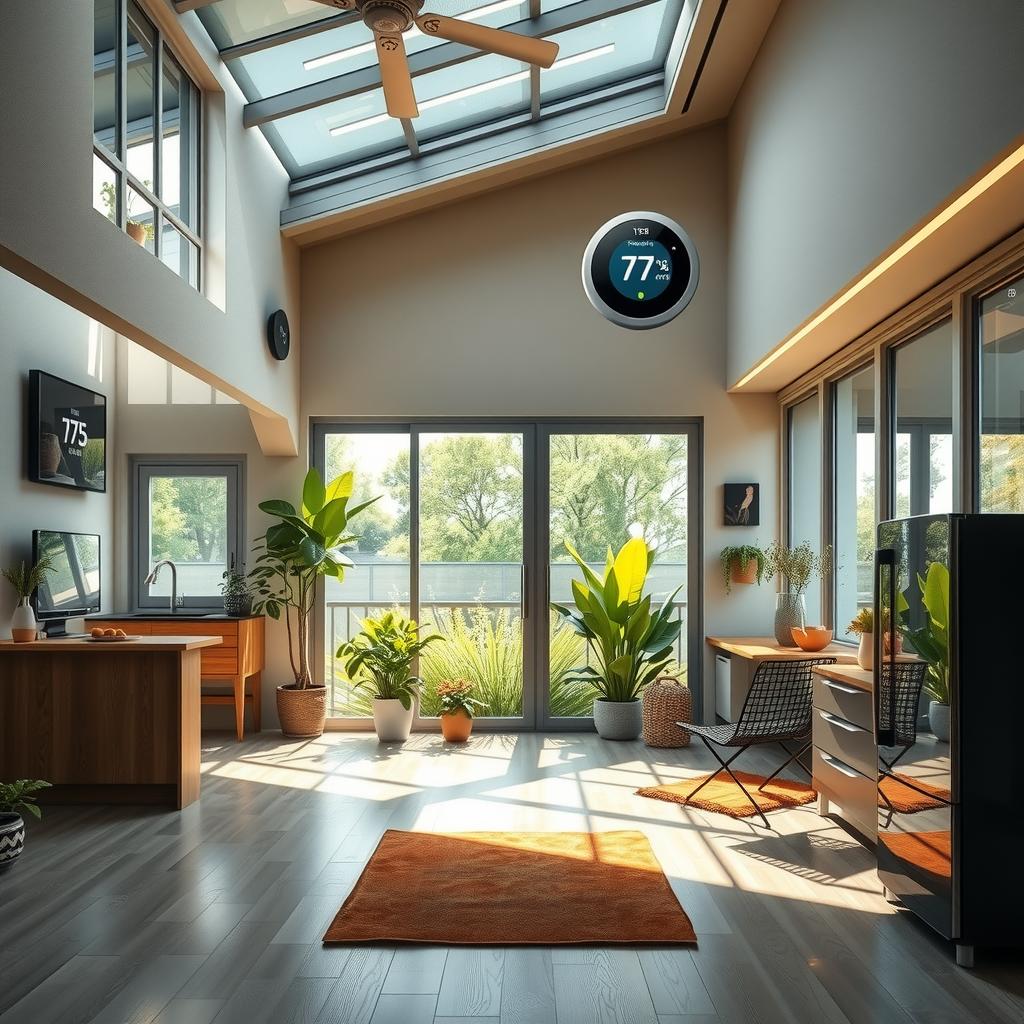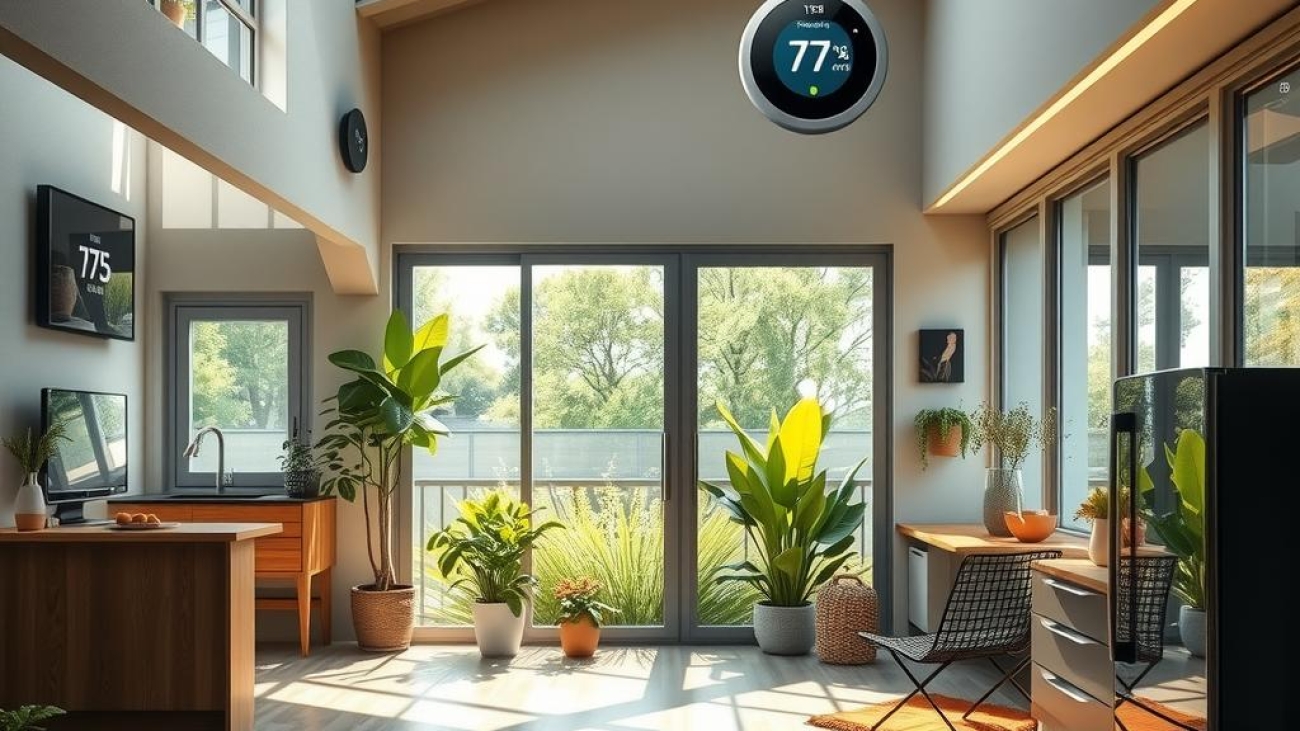In an era where technology increasingly intertwines with daily living, the concept of a smart home emerges as both a necessity and an opportunity for individuals seeking to enhance their quality of life while championing sustainability. At the heart of this evolution lies the Energy Management System, an innovative solution designed to optimize energy consumption across various household devices. By leveraging advanced smart home technology, homeowners can achieve significant gains in energy efficiency, not only reducing costs but also minimizing their carbon footprint. The integration of real-time energy monitoring tools allows users to track their consumption patterns, identifying areas ripe for improvement.
The significance of employing an Energy Management System cannot be overstated when considering its role in creating automated routines that streamline everyday tasks while conserving resources. For instance, smart plugs enable appliances to operate during off-peak hours or shut down automatically when not in use, contributing significantly to overall energy management. Additionally, features such as smart window coverings can regulate indoor temperatures by blocking or allowing sunlight based on real-time weather conditions—further enhancing HVAC optimization efforts and ensuring maximum comfort with minimal energy expenditure.
Moreover, the transition towards renewable energy integration is facilitated by sophisticated systems like the Energy Management System, which allows households equipped with solar panels or other renewable sources to efficiently manage generated power. This capability empowers users to store excess energy through advanced energy storage systems and utilize it during peak demand periods. In tandem with this approach are initiatives promoting water conservation technology that often accompany modern smart homes; integrating these solutions alongside traditional energy-saving measures creates a holistic strategy for sustainable living.
Incorporating energy-efficient lighting strategies into a smart home setup complements these advancements by enabling automated controls tailored around individual lifestyles and preferences. With intelligent lighting systems capable of adjusting brightness based on occupancy or time-of-day settings—homeowners harness yet another layer of control over their environment through the guidance offered by an effective Energy Management System.
Lastly, emerging trends such as gamification for conservation encourage residents to engage actively in monitoring usage patterns through competitive elements and rewards-based programs integrated into many modern systems. Employing these strategies fosters a culture where both individuals and families recognize the impact they have on resource utilization—a fundamental step toward achieving broader goals related to sustainability within communities at large.
By embracing comprehensive solutions like the Energy Management System, homeowners take decisive steps toward transforming their abodes into eco-friendly sanctuaries that prioritize efficiency without compromising convenience or comfort.

Key Points:
-
Smart Meters and Real-Time Energy Monitoring: This technology allows homeowners to track their energy consumption in real-time, providing valuable insights that can lead to improved energy efficiency. The integration of smart meters with an Energy Management System enables users to monitor usage patterns and identify areas for optimization.
-
Automated Energy-Saving Routines and Schedules: By utilizing automated routines through an Energy Management System, homeowners can set schedules for devices and appliances that maximize energy efficiency. This includes leveraging smart plugs to control device-level energy management, ensuring that power is conserved during peak hours or when devices are not in use.
-
Integration of Renewable Energy Sources: Incorporating renewable energy sources such as solar panels into a smart home setup enhances sustainability while reducing reliance on traditional power grids. An Energy Management System facilitates the seamless integration of these renewable systems, optimizing the overall performance of the home’s energy management strategy while promoting long-term sustainability practices.

Enhancing Energy Efficiency in Smart Homes
Harnessing Intelligent Solutions for Sustainable Living
In today’s world, the integration of smart home technology has revolutionized how households manage their energy consumption. One pivotal tool in this transformation is the Energy Management System, which empowers homeowners to monitor and optimize energy usage effectively. With features such as real-time energy monitoring, families can now visualize their consumption patterns, identifying peak usage times and areas where waste occurs. This awareness fosters a culture of conservation; when individuals see how much electricity certain devices utilize, they are more inclined to adjust their habits accordingly. For instance, implementing automated routines allows lights and appliances to function only when necessary—turning off heating or cooling systems during the day when no one is home significantly cuts down on unnecessary expenditure.
Moreover, integrating renewable energy sources like solar panels into smart homes further enhances sustainability efforts. The Energy Management System enables homeowners to track solar production versus household consumption in real time, optimizing the use of generated power while minimizing reliance on grid electricity. By utilizing energy storage systems, surplus solar energy can be stored for later use during peak demand periods or at night, ensuring that households maximize their renewable resources efficiently. Coupled with technologies such as smart plugs that allow users to control device power remotely or schedule operations based on utility rates contributes immensely towards an eco-conscious lifestyle.
Optimizing Home Systems for Sustainability
Streamlining HVAC and Lighting Solutions
The optimization of heating, ventilation, air conditioning (HVAC), and lighting forms another cornerstone of reducing a home’s carbon footprint through enhanced energy efficiency strategies facilitated by smart technologies. Using advanced sensors embedded within an Energy Management System, these elements can automatically adjust settings based on occupancy or even weather conditions outside—thereby only using resources when absolutely necessary. For instance, smart window coverings can block out excessive sunlight during hot days but open up during cooler afternoons to harness natural warmth without running heaters excessively.
Lighting plays a crucial role too; employing energy-efficient lighting strategies ensures less energy wastage compared to traditional bulbs while providing ample brightness tailored through adjustable intensity settings linked with daylight responsiveness via motion detectors integrated into the home’s system architecture. Such innovations not only cut down costs but create a comfortable living environment conducive to both relaxation and productivity.
Water Conservation Technologies
Pioneering Efficient Resource Usage
Water conservation technology represents another significant aspect wherein smart homes exhibit high sustainability potential through intelligent management practices offered by systems like the Energy Management System. Devices equipped with leak detection sensors notify homeowners instantly about any unusual water flow indicating leaks before they escalate into costly repairs—a proactive approach that minimizes resource wastage drastically.
Furthermore, automated irrigation controls ensure gardens receive optimal watering schedules based solely upon moisture levels detected in soil rather than arbitrary timers leading often towards overwatering scenarios common among traditional setups lacking precision tools available today thanks again due diligence enabled by modern tech solutions aimed explicitly at bolstering conservation efforts across residential landscapes—not just focusing narrowly on electrical consumption alone.
Gamification for Conservation Efforts
Engaging Households in Energy-Saving Practices
An innovative approach gaining traction among environmentally conscious consumers involves gamification elements built into platforms associated with an Energy Management System designed specifically around user engagement concerning overall performance improvements stemming from targeted actions taken daily regarding resource utilization both inside residential spaces as well externally managed environments alike! By introducing friendly competition amongst family members about who achieves lower monthly bills or conserving more water helps incentivize responsible behaviors whilst fostering teamwork toward shared goals benefiting everyone involved collectively!
Thus adopting measures including visual dashboards showcasing progress metrics alongside rewards points redeemable against future purchases nurtures motivation encouraging continual participation aligning themselves holistically within broader movements emphasizing sustainable lifestyles reflecting positively upon communities engaged actively supporting initiatives combating climate change directly influencing global standards moving forward beyond mere individual achievements realized individually remaining inherently impactful long term outcomes witnessed globally setting precedent worthy emulation everywhere!

Understanding Smart Monitoring Solutions
Instant Feedback for Better Energy Management
Smart monitoring solutions have revolutionized the way individuals and businesses manage energy consumption, providing valuable insights through advanced technology. At the heart of this transformation are devices such as smart meters and smart plugs, which offer real-time data about energy usage. These technologies enable users to track their consumption patterns with unprecedented accuracy, allowing them to identify areas where they can enhance their energy efficiency. By integrating an Energy Management System, consumers gain access to a centralized platform that consolidates information from various sources, making it easier to understand trends in energy use over time. This level of transparency empowers users not only to reduce costs but also to contribute positively towards environmental sustainability by minimizing waste.
Furthermore, the integration of innovative dashboards into these systems facilitates user engagement by presenting complex data in an easily digestible format. Dashboards often feature visual representations such as graphs and charts that detail daily or monthly energy use statistics alongside benchmarks for comparison. The availability of this information encourages proactive management practices; users can set automated routines that optimize power utilization based on real-time feedback from their Energy Management System. For instance, one might schedule heavy appliances like dishwashers or washing machines during off-peak hours when electricity rates are lower or integrate renewable energy sources into their home setup seamlessly — all while leveraging tools designed for enhanced control.
Enhancing Home Automation with Smart Technology
Streamlined Control Through Real-Time Insights
The advent of smart home technology has further amplified the effectiveness of monitoring solutions in managing household energy consumption efficiently. With features like smart window coverings, homeowners can automatically adjust curtains based on sunlight exposure throughout the day—reducing reliance on heating and cooling systems significantly when coupled with effective HVAC optimization strategies within an Energy Management System framework. Likewise, implementing energy-efficient lighting strategies, such as utilizing LED bulbs controlled via smart plugs allows occupants not only better control over ambient lighting but also significant reductions in overall electricity usage.
Moreover, advancements in water conservation technology highlight how interconnected devices serve dual purposes: reducing both water and power expenditure simultaneously through integrated systems managed under one umbrella—the Energy Management System. The ability for families or businesses to gamify conservation efforts creates a community-driven initiative where participants strive towards common goals related directly back to savings metrics displayed across various dashboards linked within these ecosystems enhances accountability at every level—making sustainable choices become habitual rather than sporadic decisions made without insight.
Future-Proofing Energy Consumption
Preparing Homes for Sustainable Living
As consumer demand grows for more sustainable living options intertwined with modern conveniences offered by automation technologies—including those found within an effective Energy Management System, manufacturers respond by developing sophisticated solutions capable of accommodating future needs effectively while addressing current challenges faced regarding resource management today. Energy storage systems play pivotal roles here since they allow surplus generated from renewable resources (like solar panels) during peak sun hours stored intelligently until required later—effectively smoothing out any fluctuations associated typically seen between generation-consumption cycles otherwise leading wasted opportunities lost due inefficient practices historically observed prior advancements brought forth via digitalization processes now commonplace among households worldwide striving achieve lowered carbon footprints sustainably going forward beyond immediate financial incentives enjoyed presently alone.
In conclusion, embracing comprehensive approaches incorporating state-of-the-art innovations revolving around concepts discussed herein represents essential steps taken toward creating environments conducive fostering responsible stewardship our planet’s finite resources long-term viability generations yet unborn witness potential benefits realized resulting collaborative efforts aimed optimizing performance engaging interfaces available harnessing foundational principles rooted deeply understanding dynamics underlying interactions between human activity natural world surrounding us constantly evolving ever-changing landscape requiring adaptability resilience approach challenges posed confronted head-on collaboratively united purposefully dedicated improving outcomes collectively together shared vision where everyone contributes making difference transforming lives enduring legacy left behind posterity thrives harmoniously coexistence nature itself unyielding amidst rapid technological advancement beckoning seize opportunities await each turning point encountered journey ahead full promise possibilities limitless horizons awaiting exploration!
The Future of Home Automation in Sustainable Living
Embracing Efficiency through Technology
The integration of automated systems into everyday living has revolutionized the concept of sustainability within homes. One significant aspect is the implementation of an Energy Management System, which serves as a central hub for managing various smart home technologies aimed at enhancing energy efficiency. This system allows homeowners to establish automated routines that optimize energy consumption based on real-time data and personal preferences. For instance, with advanced scheduling capabilities, lights can be programmed to dim during peak hours or turn off when no one is present in a room, thus minimizing unnecessary electricity use.
Moreover, the role of renewable energy integration cannot be overstated. By connecting solar panels or wind turbines to an Energy Management System, homeowners can monitor their energy production and consumption effectively. This seamless interaction not only supports sustainability efforts but also contributes to considerable cost savings over time as reliance on traditional power sources diminishes. With features like real-time energy monitoring, residents become more aware of their usage patterns and can make informed adjustments accordingly—whether it’s utilizing energy-efficient lighting strategies or optimizing HVAC performance through intelligent climate control settings.
Enhancing Home Comfort with Advanced Systems
Optimizing Resources Efficiently
In addition to promoting conservation behavior among users through gamification techniques for conservation, modern technology offers remarkable advancements in HVAC optimization within residences. An effective Energy Management System enhances temperature regulation by incorporating smart window coverings that adjust themselves according to weather conditions and sunlight exposure. This feature significantly improves indoor comfort while reducing heating and cooling demands, which are often responsible for high utility bills.
Furthermore, integrating water conservation technology into these automated systems can lead to substantial reductions in household resource usage without sacrificing quality of life. Automated irrigation systems paired with soil moisture sensors ensure plants receive just the right amount of water needed; this level of precision conserves both water resources and reduces costs associated with overwatering—demonstrating how efficient management translates into tangible benefits across multiple domains.
It is evident that employing smart plugs throughout a home considerably elevates its overall efficiency profile; they facilitate remote control over connected appliances while allowing users to set schedules tailored specifically toward their lifestyles—ensuring devices are used optimally without excess drain on resources during idle times.
As society shifts towards more sustainable practices facilitated by sophisticated technologies like an Energy Management System, it becomes imperative for homeowners not only to adopt these innovations but also understand their potential impacts fully. Through continuous education about available solutions—from renewable energy options such as battery storage systems down through optimized appliance operations—they will find empowerment in creating environmentally friendly homes designed for both comfort and efficiency.
Frequently Asked Questions:
Q: How can smart home technology help reduce energy consumption?
A: Smart home technology significantly contributes to energy efficiency by utilizing tools like Energy Management Systems that provide real-time energy monitoring. These systems enable homeowners to track their energy usage, identify high-consumption devices through smart plugs, and implement automated routines tailored for optimal performance.
Q: What role do automated routines play in a smart home’s energy management?
A: Automated routines are essential in optimizing energy efficiency within a smart home. By leveraging Energy Management Systems, users can create schedules for devices based on their usage patterns, ensuring that appliances operate during off-peak hours or when renewable energy sources are available. This not only lowers utility bills but also supports sustainability efforts.
Q: How does the integration of renewable energy sources enhance a smart home’s sustainability?
A: Integrating renewable energy sources such as solar panels into a smart home setup maximizes the benefits of Energy Management Systems. These systems allow homeowners to monitor the generation and consumption of renewable power effectively while optimizing grid interaction. Additionally, features like HVAC optimization and battery storage solutions ensure efficient use of generated electricity, promoting long-term sustainability and reduced environmental impact.
